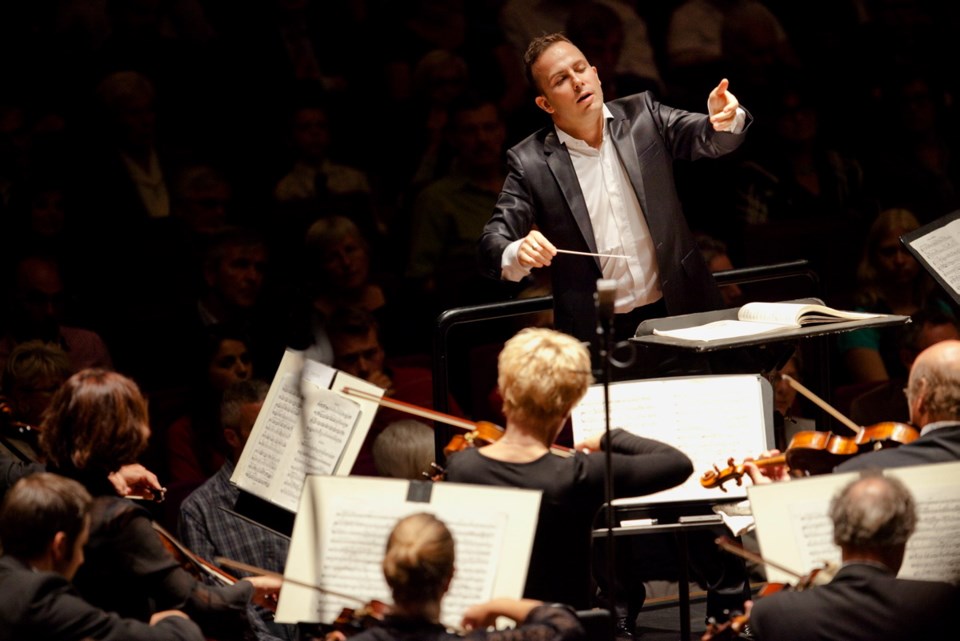What: Yannick Nézet-Séguin and the Victoria Symphony
Where: Royal Theatre
When: Saturday, 8 p.m.
Tickets: $30 to $80250-385-6515
While there are plenty of devotees, Anton Bruckner’s music isn’t for everyone. Some adore the 19th-century Austrian composer’s symphonies. Others find them slow-moving and overblown.
Still, if anyone can make Bruckner sing, it’s Montreal conductor Yannick Nézet-Séguin, collaborating with the Victoria Symphony this weekend.
The 40-year-old Nézet-Séguin will lead the orchestra through Bruckner’s Symphony No. 4, as well as Tchaikovsky’s Romeo and Juliet: Fantasy-Overture.
A former principal guest conductor of the Victoria Symphony, Nézet-Séguin went on to become one of Canada’s most admired conductors.
The former prodigy (dubbed a “boy wonder” by one critic) was just 25 when he was appointed director of Montreal’s Orchestre Metropolitain.
A decade later, Nézet-Séguin became director of the Rotterdam Philharmonic and principal guest conductor of the London Philharmonic.
Today, he’s music director of the Philadelphia Orchestra, as well as retaining his positions in Rotterdam and Montreal.
Nézet-Séguin regularly conducts leading orchestras in Europe: Berlin, Munich, Vienna. (Indicative of his rising-star status were recent rumours he might replace James Levine as music director of New York’s Metropolitan Opera.)
A musical comet who (unlike some prodigies) never burned out, Nézet-Séguin claims a special affinity for Bruckner. The first Bruckner symphony he conducted was the Ninth, in Montreal, when he was 26 years old.
He says he felt “strangely at ease” with the composer, even experiencing the eerie feeling he had conducted the work before. Such empathy is “very hard to describe and even more to explain,” Nézet-Séguin said over the phone this week from Montreal.
“Some people say: ‘Oh, I don’t like Bruckner because these are long pieces and they’re maybe less accessible than others.’ [But] I was always in love with Bruckner. I was in love with his music from the very beginning of my career.”
If you’re new to Bruckner, Saturday’s concert is likely a good introduction. One of the composer’s more popular works, Nézet-Séguin notes, Symphony No. 4 is more accessible than some of the others.
It’s romantic, not in the lovey-dovey sense of the word, but in terms of German romanticism: One can imagine castles, hunting scenes, idyllic villages and peasant dances.
Nézet-Séguin said the symphony’s imposing structure puts him in mind of a cathedral.
“It’s like a big monument, a big church with all the big pillars and the marble and the decoration. One has to have a sense of majesty and awe about his works,” he said.
“I want to approach this symphony with a sense of journey, so the audience will be captivated from beginning to end. That’s my goal.”
It’s a homecoming of sorts for Nézet-Séguin. In 2002, he started a three-season term as principal guest conductor of the Victoria Symphony. That affiliation is why he accepted the orchestra’s invitation to conduct this time. As Nézet-Séguin says: “I wanted to see my friends again after so long.”
He recalls his Victoria tenure fondly. At that early stage in his career, Nézet-Séguin did a lot of guest conducting. He felt a special “chemistry” with the Victoria Symphony, retaining fond memories of rehearsals and, in particular, leading the orchestra through four Brahms symphonies in a single season.
“That is something I will always remember,” he said.
“I’m curious to see new faces as well as familiar faces in the Victoria Symphony.
“In my mind, I’m not a different Yannick. And I hope nobody will find I’m different. But hopefully, I have evolved.”
The Montreal-born son of university professors, Nézet-Séguin began piano lessons as a five-year-old. When he was 10, he saw Charles Dutoit conduct the Orchestre Symphonique de Montréal on television. Something about it stirred the boy. The seed of an idea, to become a conductor, was planted.
“You never know how, with one child or another, how it will resonate with one kid or another to see [such a thing]. It’s a fascinating thing, an orchestra,” Nézet-Séguin said.
Poised to turn 41 in March, the conductor is well past the wunderkind stage.
The “child prodigy” designation is not always welcomed by those labelled with it. Yet Nézet-Séguin says it never rankled. He always knew he was in music for the long run. He realized what he wanted even as a child — and he has worked hard for it ever since.
Today, Nézet-Séguin is a globetrotter, with homes in Montreal, Philadelphia and Rotterdam.
So where is his real home?
“Let’s say in Montreal,” he said with a laugh. “That’s where my cats live.”



